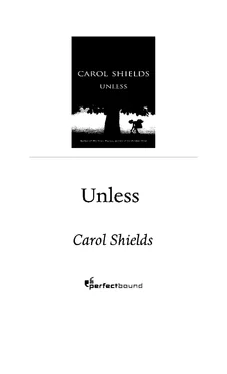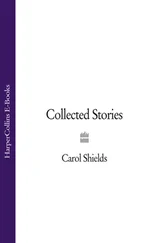Carol Shields - Unless
Здесь есть возможность читать онлайн «Carol Shields - Unless» — ознакомительный отрывок электронной книги совершенно бесплатно, а после прочтения отрывка купить полную версию. В некоторых случаях можно слушать аудио, скачать через торрент в формате fb2 и присутствует краткое содержание. Жанр: Современная проза, на английском языке. Описание произведения, (предисловие) а так же отзывы посетителей доступны на портале библиотеки ЛибКат.
- Название:Unless
- Автор:
- Жанр:
- Год:неизвестен
- ISBN:нет данных
- Рейтинг книги:4 / 5. Голосов: 1
-
Избранное:Добавить в избранное
- Отзывы:
-
Ваша оценка:
- 80
- 1
- 2
- 3
- 4
- 5
Unless: краткое содержание, описание и аннотация
Предлагаем к чтению аннотацию, описание, краткое содержание или предисловие (зависит от того, что написал сам автор книги «Unless»). Если вы не нашли необходимую информацию о книге — напишите в комментариях, мы постараемся отыскать её.
Unless — читать онлайн ознакомительный отрывок
Ниже представлен текст книги, разбитый по страницам. Система сохранения места последней прочитанной страницы, позволяет с удобством читать онлайн бесплатно книгу «Unless», без необходимости каждый раз заново искать на чём Вы остановились. Поставьте закладку, и сможете в любой момент перейти на страницу, на которой закончили чтение.
Интервал:
Закладка:
“I’d like to speak to Mrs. Reta Winters, please,” said a man’s resonant voice.
“This is Reta Winters speaking.” I was holding the phone in my left hand and unloading the dishwasher with my right.
“Have I caught you at an awkward moment?” the voice asked. “You’re not in the middle of breakfast?”
“No,” I said and stopped bashing the china about. “This is a good time.”
“I just phoned to introduce myself,” said the deep baritone voice with its range of lighter musical notes. “My name is Arthur Springer from Scribano & Lawrence, and I have the great honour, Mrs. Winters, of being your new editor.”
“Oh,” I said, genuinely pleased; such professional civility was impressive. “Well, how nice of you to phone and introduce yourself, Mr. Springer.”
“I hope you’ll call me Arthur once we get to know each other.”
“Well, then you must call me —”
“Reta. It would be a pleasure, Reta. I’m so pleased you feel that way. That will get us off to a good start. I want to say right off that I know I can’t begin to replace the inestimable Mr.
Scribano.”
“Such a tragedy —”
“I can tell you, Reta, that our Mr. Scribano was delighted that you were working on a second novel, a sequel to My Thyme Is Up. He told me as much just a few days before his fall.”
“Did he really? He was always very kind and encouraging —”
“I had nothing but respect for him as a person and as an editor. I’ve been with the firm since the beginning of last year and have had the good fortune to learn a good deal from him.
Though, of course, we represent different generations and have our separate approaches. My own approach is very much dialogic. My training was at Yale, originally. Then Berkeley.”
“Well, yes —”
“Now, can you give me an idea, Reta, of when you will next be in New York.”
“Well actually —”
“I think it’s essential that we sit down and go over the manuscript together. I’m a bit of a point-by-point man when it comes to editing, and, unlike many of my contemporaries, I lack faith in e-mail communications or even the telephone.”
“But there is no manuscript, in a sense.” I resumed my task of unloading the dishwasher, but very quietly now, lifting the plates out one by one, stacking them softly on the shelf.
“That is, the manuscript is coming along, but very slowly.”
“In percentage terms?”
“Sorry, I don’t quite —”
“Are you at the halfway point, Reta, or three-quarters? Or?”
“Oh. Well, I’m not quite sure. But in any case, I’m afraid I have no plans to be in New York, not in the near future.”
“Fine, fine. Just send me what you’ve got so far.”
“But I don’t think I can do that. You see, what’s down on paper, or on disk really, is still very much in the, you know, the tenuous mode —”
“Oh, I assure you, Reta, that I appreciate the fact that a draft is a draft is a draft. That is one of the first things a fiction editor must understand.”
“I don’t see how I can —”
“Look, Reta, I’m going to give you our UPS number. Have you got a pencil handy? All you have to do is print out the pages and bundle them up. I’ll phone and make the arrangements for a pick-up. What about later this afternoon? We’re hoping for a fall publication, which means moving along very rapidly. You’ll find I’m an appreciative editor. I like to bring out the best in a writer. Have you read Darling Buds ? That was one of my writers.”
“ Darling Buds ?”
“I’ll courier you a copy right away.”
“Oh, that would be —”
“There is just one thing I want to say, Reta, before we say goodbye. I love Alicia. Your Alicia. I want you to know that my devotion to her is enormous. I am greatly attracted to her reflec-tive nature. I’ve read My Thyme Is Up several times now, and each time I love her more. There’s a golden quality about her. As though she were a gold autumn leaf among others less gold. I’ve thought and thought about what it is that draws me to your Alicia. It’s not her sensuality, not that she is lacking in that department, not in the least. The way she has of sitting still in a chair. Just sitting. Her generosity, that’s part of it. Her tolerance too. But what really makes me want to take her in my arms is her goodness.”
“I’m sorry. I didn’t quite hear what you said, Mr. Springer, Arthur. Did you say —?”
“Her goodness. Her profound human goodness.”
“Oh. Goodness.”
“Yes, goodness.”
“That’s what I thought you said.”
Since
“Arrange to have her kidnapped,” people said when Norah turned up at Bathurst and Bloor, “and then have her professionally deprogrammed.”
Sally said: “Have the police pick her up for questioning. They’ve seen lots of these cases and know how to handle them.”
Other friends — Lynn, Annette — said: “Use a little force. If you and Tom force her into the car and drive her straight home, the shock will bring her to her senses. That’s what she needs to break the spell, a shock.” I did actually try this one day; I parked, illegally, on Bathurst, as close to her as I could get, got out of the car, and grabbed her by the hand. She screamed horribly and pulled back from me. I felt her glove coming off. It was as though she were an incendiary object, a hot coal. People started to gather, and I got back into the car quickly — forgive me, Norah, forgive me — and drove away.
Frances Quinn from the Promise Hostel said to us: “She is in good health at the moment.
She seems sane, but rather determined. I’ve offered her counselling, of course, but she appears to be sure she knows what she’s doing. She’s not yet twenty. Time’s on her side. I’ve seen stubborn cases before, and in the end they usually yield.”
One friend — or acquaintance, rather — said to me: “You’re all worked up about nothing.
This isn’t such a big deal, a kid taking a season out on the street. It happens.”
Dr. David McClure, the psychiatrist we consulted, urged non-interference. “Her actions indicate that she is giving herself something. A gift of freedom, you might say, the right to be a truant in her own life. You may not think so, but she has made practical arrangements to stay alive. Vagrancy can be thoughtful or careless, and she has chosen the former. But then she is intelligent. Intelligence will see her through this crisis. Crisis, I say, but that isn’t really the word I should have used. It is more in the nature of a behavioural interlude in which she is either escaping something unbearable or embracing the ineffable.”
“Which do you think it is?”
“Ah, that is unanswerable.”
Our daughter Chris said: “What happened? What terrible thing happened to her? There has to be a thing. ”
Natalie said: “I don’t believe it, I’ll never believe it, she’d never do this if she were in her right mind.”
Lois, my mother-in-law, said: “I can’t bear this. Not Norah, not Norah.”
Willow Halliday said: “I’ve always heard that people begging on the street are frauds. That they make big bucks, a couple of hundred dollars a day. Some of them have cell phones, I’ve seen that myself in Toronto.”
Have I articulated how difficult I find Willow Halliday, the mother of one of Norah’s friends? Willow is a superb cook and she has said to me a dozen times — I exaggerate, but only a little — that she reads cookbooks the way other people read novels. “But wouldn’t you be less of a bore if you read novels?” I long to say, but of course I don’t.
Tracy Halliday, a horsey, popular girl, has been a friend of Norah’s since childhood. Tracy and another friend made the trek down to Bathurst and Bloor, where they presented Norah with an enormous jar of marbles. (Natalie and Chris were there and later reported the incident to Tom and me.) Tracy knelt down and shouted into Norah’s ear, explaining that each marble represents a Saturday, and that if Norah lives to be eighty, she will enjoy an astounding 4,160 such days. Of course, at nearly twenty, she has used up some of the Saturday mornings, but still has more than 3,600 left. If she takes one marble out each week, she will see her supply slowly diminish and will come to value time and her own life.
Читать дальшеИнтервал:
Закладка:
Похожие книги на «Unless»
Представляем Вашему вниманию похожие книги на «Unless» списком для выбора. Мы отобрали схожую по названию и смыслу литературу в надежде предоставить читателям больше вариантов отыскать новые, интересные, ещё непрочитанные произведения.
Обсуждение, отзывы о книге «Unless» и просто собственные мнения читателей. Оставьте ваши комментарии, напишите, что Вы думаете о произведении, его смысле или главных героях. Укажите что конкретно понравилось, а что нет, и почему Вы так считаете.












